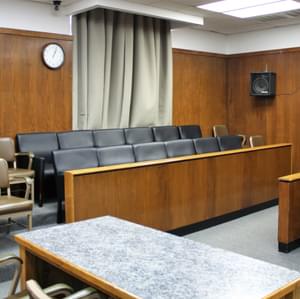
“If you are charged with capital murder … you are less likely to get a fair trial,”
On October 28, 2024, hearings began in Kansas’ Wyandotte County District Court regarding the constitutionality of the state’s death penalty and its capital jury selection process. A coalition of the ACLU Capital Punishment Project, the ACLU of Kansas, the Kansas Death Penalty Unit, and the law firms Hogan Lovells and Ali & Lockwood brought the challenge. The team argues that the death penalty, which is rarely used in Kansas, is “arbitrary, racially discriminatory, unreliable, and unnecessary” and constitutes cruel and unusual punishment in violation of both the state and federal constitutions. The team also characterized as discriminatory the requirement for jurors to be “death-qualified,” or willing to impose a death sentence, to serve on a capital jury.
“Every person accused of a crime is entitled to a fair, impartial jury, but that’s never the reality in capital cases,” said Cassandra Stubbs, director of the ACLU’s Capital Punishment Project. “The evidence is overwhelmingly consistent that Black Kansans are disproportionately disqualified from serving on capital juries. Death qualification, like the death penalty itself, is unconstitutional and undermines justice for everyone. We are committed to ending both.” According to a press release from the ACLU, studies have demonstrated the practice of death qualification often excludes “Black people, women, and those of religious faith,” who often oppose the death penalty. This results in a capital jury that is “whiter, more male, more conviction prone, less likely to debate the evidence, and far more likely to sentence a defendant to death,” rather than a jury of one’s peers, which also contributes to the higher rate of wrongful conviction in capital cases.
The ACLU-led challenge is brought on behalf of pretrial capital defendant Antoine Fielder, who is accused of killing two sheriff’s deputies during prisoner transport, and another pretrial capital defendant, Hugo Villanueva. During opening statements, Wyandotte County District Attorney Mark Dupree argued that “neither of these arguments are ripe for hearing,” since neither defendant has been tried and convicted.
Kansas rarely uses the death penalty — a point highlighted in the defendant’s petition to support the determination of the practice as “unusual punishment,” which is constitutionally prohibited. The petition, referencing a 2024 report by Columbia Professor Jeffrey Fagan, notes that the “odds of any Kansan convicted of murder being sentenced to death are ‘less than one tenth of one percent,’” and referencing a 2024 report by University of North Carolina at Chapel Hill Professor Frank Baumgartner, notes that “the death penalty has been imposed in less than 1% of all homicides in Kansas.” The state, which currently has 9 prisoners on death row, has not carried out an execution since 1965.
The death penalty in Kansas is unjust from start to finish and goes against all of the most fundamental principles of justice,” said Katie Ali, attorney at Ali & Lockwood. “From its disproportionate impact on Black Kansans to the high risk of wrongful convictions, it is clear that the death penalty serves neither fairness nor public safety. It’s time for Kansas to abandon this deeply unjust system.”
ALLISON KITE, ACLU starts hearings on Kansas death penalty by emphasizing evidence of racial bias, Kansas Reflector, October 28, 2024; SHERMAN SMITH, ACLU challenges Kansas death penalty as ‘arbitrary, racially discriminatory, unreliable’, Kansas Reflector, October 16, 2024; Press Release, ACLU and Partners Challenge Death Qualification and the Death Penalty in Kansas, ACLU, October 16, 2024;
Race
Jun 14, 2024


